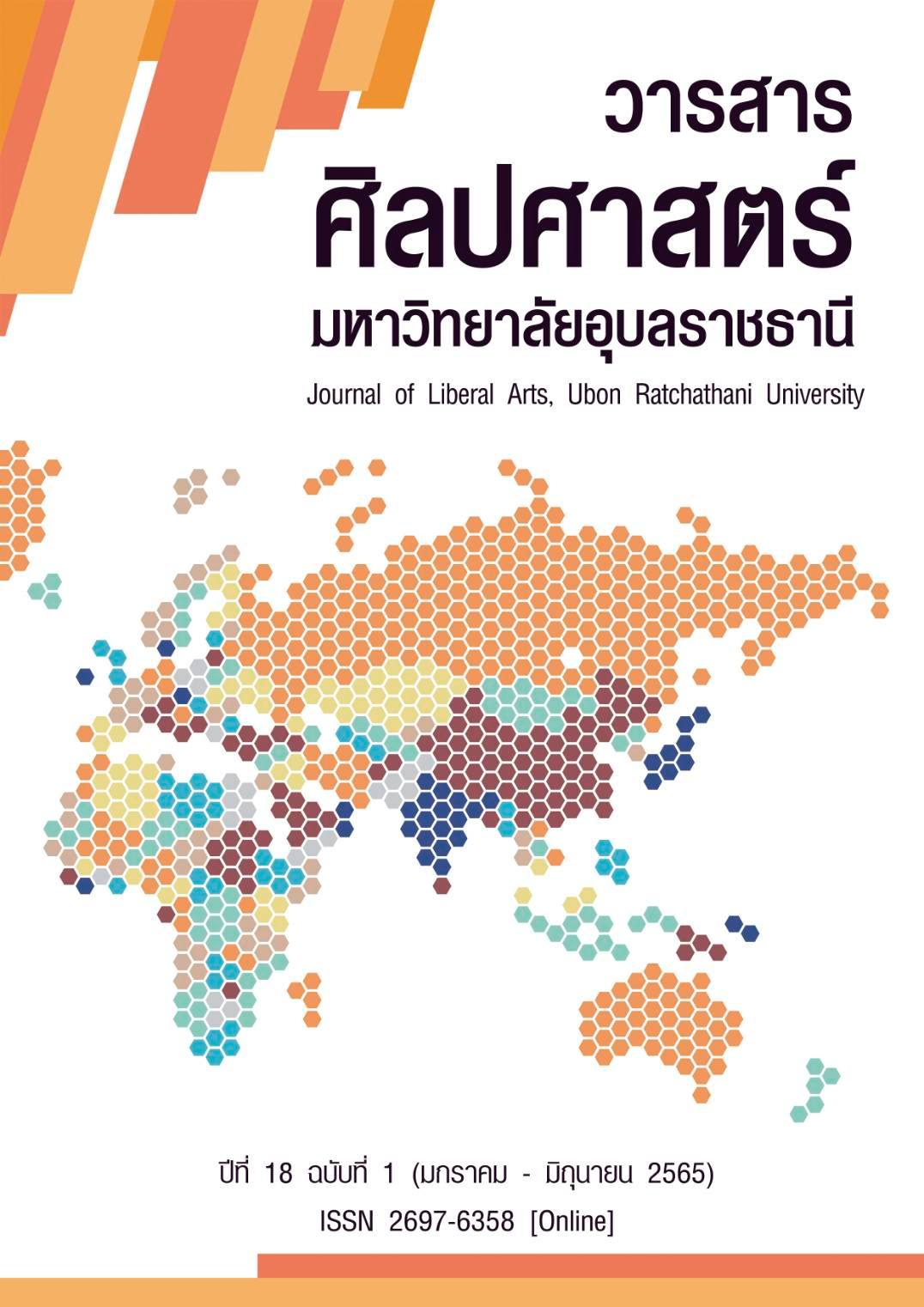การศึกษามุมมองของนักศึกษาหลักสูตรภาษาอังกฤษและ การสื่อสารเกี่ยวกับการเรียนออนไลน์ในสถานการณ์โควิด 19
Main Article Content
บทคัดย่อ
การวิจัยชิ้นนี้ศึกษามุมมองของนักศึกษาหลักสูตรภาษาอังกฤษและการสื่อสาร ในด้านการเรียนออนไลน์ในช่วงสถานการณ์การระบาดของโควิด 19 ในปีการศึกษา 2564 เก็บข้อมูลโดยการสัมภาษณ์บุคคลแบบกึ่งโครงสร้างผู้เข้าร่วมวิจัย 15 คนเพื่อให้ได้ข้อมูลเชิงลึกเกี่ยวกับมุมมองของพวกเขา นอกจากนี้ยังมุ่งเน้นไปที่วิธีการเชิงความหมายเชิงอุปนัยเพื่อการวิเคราะห์แก่นสาระ ผลการวิจัยพบว่า ประสบการณ์ของนักศึกษามีทั้งประสบการณ์เชิงบวกและเชิงลบ ประสบการณ์เชิงบวกของนักศึกษาแบ่งออกเป็นสี่ประเด็น ได้แก่ ความยืดหยุ่นและความสะดวกสบาย การบรรเทาความเครียดในการเรียน ความคุ้มค่ากับค่าใช้จ่าย และความสะดวกในการส่งงานที่ได้รับมอบหมาย ประสบการณ์เชิงลบของนักศึกษาแบ่งออกเป็น 5 ประเด็น ได้แก่ สภาพแวดล้อมที่ไม่เอื้ออำนวย การขาดปฏิสัมพันธ์ที่อาจเกิดขึ้นได้ ความไม่พร้อมของผู้สอนและนักศึกษา การขาดการควบคุมตนเอง และปัญหาสุขภาพ
Downloads
Article Details

อนุญาตภายใต้เงื่อนไข Creative Commons Attribution-NonCommercial-NoDerivatives 4.0 International License.
เอกสารอ้างอิง
Almahasees, Z., Mozen, K. & Amin, M.O. (2021). Faculty’s And Students’ Perceptions of Online Learning during COVID-19. Frontier in Education. https://doi.org/10.3389/feduc.2021.638470
Baczek, M., et al. (2021). Students’ Perception of Online Learning During The COVID-19 Pandemic: A Survey Study of Polish Medical Students. Medicine, 100 (7), p e24821. doi: 10.1097/MD.0000000000024821
Braun, V. & Clarke, V. (2006) Using Thematic Analysis in Psychology. Qualitative Research in Psychology, 3 (2), 77-101.https://DOI: 10.1191/1478088706qp063oa
Dilekli, Y., & Orakcı, Ş. (2022). Motivation in Online Learning. IGI Global, 201. https://doi.org/ 10.4018/978-1-7998-8310 4.ch009
Gray, J. A., & Diloreto, M. (2016). The Effects of Student Engagement, Student Satisfaction, and Perceived Learning in Online Learning Environments. International Journal of Educational Leadership Preparation, 11(1), n1. https://www.researchgate.net/publication/3106724 42_The_Effects_of_Student_Engagement_Student_Satisfaction_and_Perceived_Learning_in_Online_Learning_Environments
Hartnett, M. (2016). The Importance of Motivation in Online Learning. In Motivation in Online Education. Springer, Singapore. https://doi.org/10.1007/978-981-10-0700-2_2
Idris, F. et al. (2021). Academic Experiences, Physical and Mental Health Impact of COVID-19 Pandemic on Students and Lecturers in Health Care Education. BMC Med Educ 21(542). https://doi.org/10.1186/s12909-021-02968-2
Imsa-ard, P. (2020). Thai University Students’ Perceptions towards the Abrupt Transition to ‘Forced’ Online Learning in the COVID-19 Situation. Journal of Education Khon Kaen University, 43(3), 30-44. https://doi: 10.14456/edkkuj.2020.16
Khan, M. A. et al. (2020). Students’ Perception towards E-Learning during COVID-19 Pandemic in India: An Empirical Study. Sustainability, 13(1), 57. MDPI AG. http://dx.doi.org/ 10.3390/su13010057
Poole, D. M. (2000). Student Participation in a Discussion-Oriented Online Course: A Case Study. Journal of Research on Computing in Education, 33(2), 162-177. https://doi.org/10.1080/08886504.2000. 10782307
Rahmayanti, P. et al. (2022). Journal of Education Technology, 6(1), 56-66. https://dx.doi.org/10.23887/jet.v6i1.41561
Ribbins, P. (2007). Interviews in educational research: Conversations with a purpose. In A. Briggs, & M. Coleman (Eds.), Research methods in educational leadership and & Management. London: SAGE Publications Ltd.
Ryan, R., M. & Deci, E, L. (2000). Intrinsic and extrinsic motivations: classic definitions and new directions. Contemp Educ Psychol, 25, 54-67. https://doi:10.1006/ceps.1999.1020
Sah, G.K. (2021). Students' perception towards online learning at university during COVID- 19 in Nepal. Patan Pragya, 8 (1), 95-107. https://doi.org/10.3126/pragya.v8i01.42424
Sadiku, M.N.O., Adebo, P.O. & Musa S.M. (2018). Online teaching and learning. International Journals of Advanced Research in Computer Science and Software Engineering. International, 8(2), 73-75
TAT News.Org (April 2, 2020). TAT update: Thailand imposes night-time curfew from 3 April, 2020, until further notice. TAT News. https://www.tatnews.org/2020/04/tat-update-thailand-imposes-nighttime-curfew-from-3-april-2020-until-further-notice
Thanavisuth, C. (2021). Students’ perceptions of online learning during the COVID-19 pandemic: A study of undergraduate students from an international university, Thailand. AU Virtual International Conference Entrepreneurship and Sustainability in the Digital Era, 2(1), 382387. http://www.assumptionjournal.au.edu /index.php/icesde/article/view/5775
Ribbins, P. (2007). Interviews in educational research: Conversations with a purpose. In A. Briggs, & M. Coleman (Eds.), Research Methods in Educational Leadership and Management (2nd ed., pp. 207–223). London, UK: Paul Chapman Publishing Hous
Ribbins, P. (2007). Interviews in educational research: Conversations with a purpose. In A. Briggs, & M. Coleman (Eds.), Research Methods in Educational Leadership and Management (2nd ed., pp. 207–223). London, UK: Paul Chapman Publishing Hous.
World Health Organization (2020). Thailand Responding to the Novel Virus. Retrieved from https://www.who.int/thailand/ news/detail/13-01-2020-thailand-responding-to-the-novel-coronavirus
Yang, Y. & Cornelius, L.F. (2004). Students’ Perceptions towards the Quality of Online Education: A Qualitative Approach. Association for Educational Communications and Technology. https://eric.ed.gov/?id=ED48501


